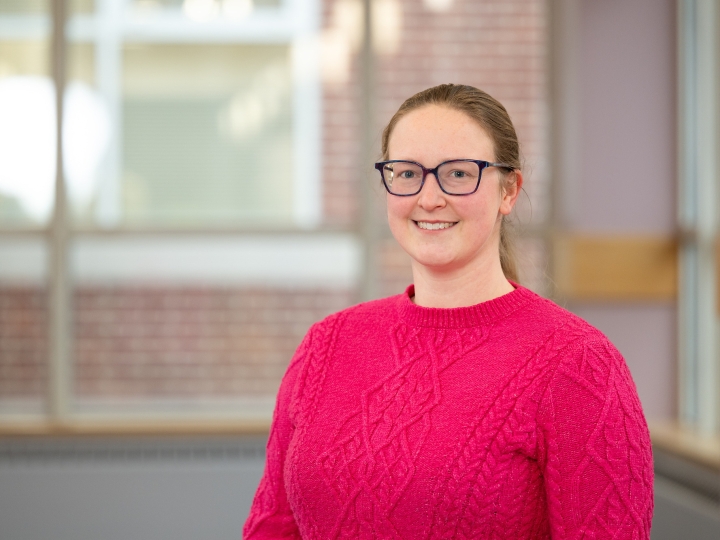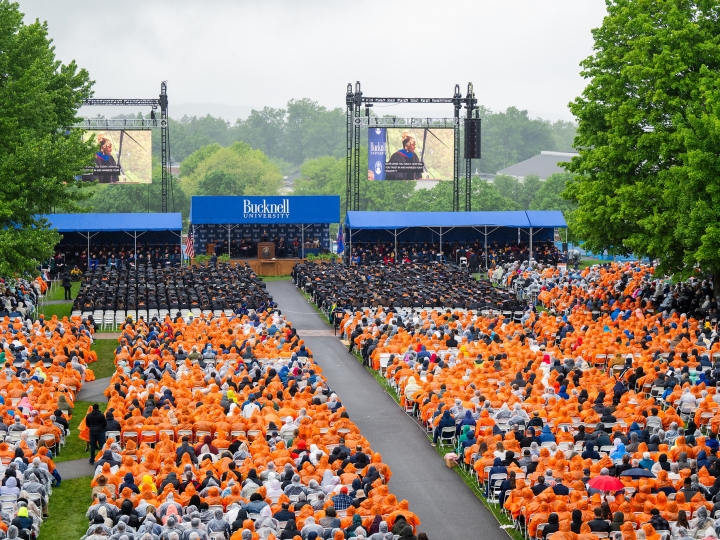
Teacher-Scholar or Scholar-Teacher?
April 16, 2016
A quarter century ago, Bucknell parsed out the distinctive identity that it maintains today.
By Gary Sojka • Photograph by Ken Yanoviak
It isn’t remembered much today, but roughly 25 years ago, Bucknell faced a crisis of enormous proportions — one that threatened to alter, perhaps permanently, the very ethos of the institution. It may even have derailed our current enviable position in the competitive residential college marketplace.
The difficulty arose out of the proudly and publicly held position that the primary mission of this university was to teach — and teach very well — undergraduate students (and a modest number of graduate students). It was stated in our hiring and promotion policies, and confirmed by the Board of Trustees, that such teaching was to be done by established scholars who were active participants in their academic fields. This stance was not intended to make Bucknell into a research-intensive university, which would engage heavily in research not connected to the education of students but rather to distinguish us from the many colleges and universities that placed little importance on faculty research or faculty-directed student research.
Bucknell found itself in a challenging intermediate position, for our mission stated clearly that education was our primary purpose, while at the same time, those who would do the teaching were required to be practitioners of their academic disciplines, not merely expositors of concepts.
The matter came to a head when two popular young teachers came up for tenure at the same time. Both were well versed in their fields, and their students were happy with the instruction they were receiving, but neither professor could demonstrate active scholarship or involvement in research programs that were highly regarded outside our own campus community. Tenure was denied, unleashing a strong backlash from outspoken students who found it difficult to accept that these popular teachers were somehow insufficiently performing their required tasks.
What was most disheartening to me, as Bucknell’s president, was that many faculty members felt that the tenure standards, requiring both excellent teaching and solid scholarly activity, were too demanding. Some professors even questioned whether or not a teacher at a place such as Bucknell needed to actively engage in scholarship beyond what was required for the preparation of lectures, laboratories and seminar courses.
This crisis, which affected the very core of the teaching enterprise as we had defined it, needed to be clearly addressed. For me, the answer was relatively straightforward. I subscribed to the old saw that “research is to teaching as sin is to the confessional. If you are not doing the former, you have no business in the latter.” In other words, only practicing scholars or researchers had the outlook and perspective needed to provide the kind of top-quality, exceptional instruction we sought for Bucknell students.
To find our way forward, the academic administration and a committee of faculty members looked to some of our most respected and popular faculty members, who managed to be first-rate teachers and scholars, and were credited with molding the postgraduation careers and lives of legions of graduates. Current and former students extolled the benefits of working with these committed and caring teachers who were also active practitioners of their disciplines. They didn’t just talk about their fields of study; they lived in them. Two of these model teacher-scholars were Professor Jack Wheatcroft ’49, English, and Professor Harold Heine, chemistry. Despite their disparate disciplines, they had a lot in common: They were popular among the faculty, had a great ability to guide the careers of students even after their graduation from Bucknell and stood for high standards and rigor in their courses. These active practitioners ushered able students into their own professional worlds.
As I reflect on that challenging period in the early 1990s, I am buoyed by the unmistakable signs that we not only made the best decision for Bucknell, but we also avoided a disastrous mistake. These are demanding times for residential colleges, which face fierce competition from online providers offering accredited degrees with more flexibility and convenience — often at a markedly lower price. There also are many lower-cost schools that offer respectable degrees to students while employing primarily adjunct faculty and relying heavily on “packaged” instruction programs. The nature and character of our research-oriented, scholarly faculty sets Bucknell apart, making us clearly distinctive and highly sought after by the most able applicants.
As an institution it would appear that we have matured beyond the point where faculty research can be thought of as an ancillary activity, a separate hoop through which a faculty member must jump in order to flourish here. Today’s professors are attracted to Bucknell because they want to teach undergraduates from the perspective of an engaged researcher or scholar, eager to invite talented students into their professional world. Research and scholarship are not ancillary but integral and essential to our faculty members’ roles as teachers of undergraduates. Perhaps we could help those outside our campus community better understand what we do here if we replaced the confusing sobriquet “teacher-scholar” with the more accurate descriptor “scholar-teacher” — a small difference in language that makes all the difference in the teaching and learning that occurs at Bucknell.
Professor Emeritus of Biology Gary Sojka served as Bucknell's president from 1984 to 1995.

